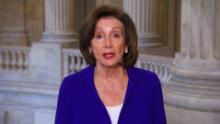
By Chandelis Duster, CNN
Washington (CNN) House Speaker Nancy Pelosi on Sunday criticized President Donald Trump's response to the coronavirus pandemic, saying "his denial at the beginning was deadly" and that as he "fiddles, people are dying."
"We should be taking every precaution. What the President, his denial at the beginning was deadly," Pelosi said in an exclusive interview with CNN's Jake Tapper on "State of the Union."
As US cases surge, Pelosi questioned when Trump was informed about the coronavirus and his knowledge on its potential impact. "I don't know what the scientists said to him, when did this President know about this, and what did he know? What did he know and when did he know it? That's for an after-action review. But as the President fiddles, people are dying. And we just have to take every precaution."
Asked by Tapper if she believes Trump's downplaying of the crisis has cost American lives, Pelosi responded, "Yes, I am. I'm saying that."
"Because when he made the other day when he was signing the bill, he said just think 20 days ago everything was great. No, everything wasn't great," she said. "We had nearly 500 cases and 17 deaths already. And in that 20 days because we weren't prepared, we now have 2,000 deaths and 100,000 cases."
Early in the outbreak, the President downplayed the extent of the possible damage from coronavirus but in recent weeks the White House coronavirus task force has sharpened the national response, forcing in part measures to get medical equipment to states and hospitals.
After the number of reported coronavirus deaths in the US doubled to more than 2,000 within two days, officials are advising residents of New York, New Jersey and Connecticut not to travel domestically. The Centers for Disease Control and Prevention issued the travel advisory Saturday, urging residents of the three states to "refrain from nonessential domestic travel for 14 days effective immediately."
When asked about Trump suggesting he wants to relax social distancing guidelines in parts of the country, Pelosi said, "His delaying of getting equipment to where it -- it continues his delay in getting equipment to where it's needed, is deadly. And now I think the best thing would be to do is to prevent more loss of life rather than open things up, because we just don't know."
Dr. Anthony Fauci, the nation's top infectious disease expert and a key member of the White House coronavirus task force, was also asked about the idea of relaxing guidelines in some areas. Fauci, reiterated his stance, that "you don't make the timeline, the virus makes the timeline." But Fauci also told CNN that he's "not against releasing the restrictions" as long as the proper measures such as efficient testing are in place."
"I'm actually for it, in an appropriate place. But I don't recommend it unless we have the tools in place in real time to do the things I just said," he told Tapper. "If we can do that, we can keep things contained without slipping into the need of having to mitigate the way they are in New York, in New Orleans, and other places now. So it's doable. But it's only doable if you put the tools in place."
On Friday, Trump signed a historic bipartisan $2 trillion stimulus package in response to the coronavirus pandemic. The bill allocates at least $1.25 billion to the states and $500 million to the District of Columbia. Some have criticized the bill, including New York Gov. Andrew Cuomo. The Democratic governor was critical of the funding amount, saying the bill did not "address the revenue shortfall."
Asked about Cuomo's comment, Pelosi said, "We have to do more." She called the bill "a down payment."
"I've talked to the chairman of the Fed, the Federal Reserve Bank, Mr. Powell, Chairman (Jerome) Powell, and asked him to do much more because they have the authority to do so, even more authority, since we passed this bill," she told Tapper. "But we have to pass another bill that goes to meeting the need more substantially than we have."
This story has been updated with additional comments from Nancy Pelosi on CNN's "State of the Union."





